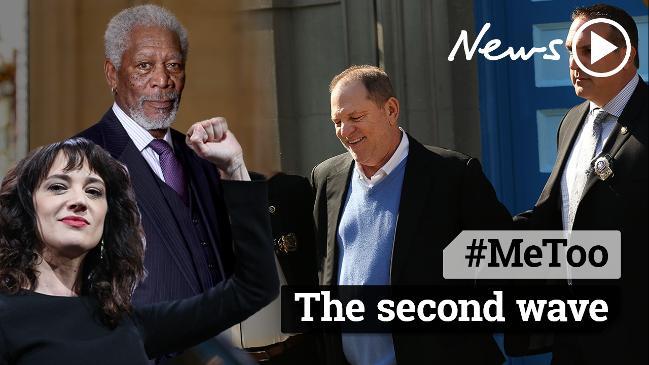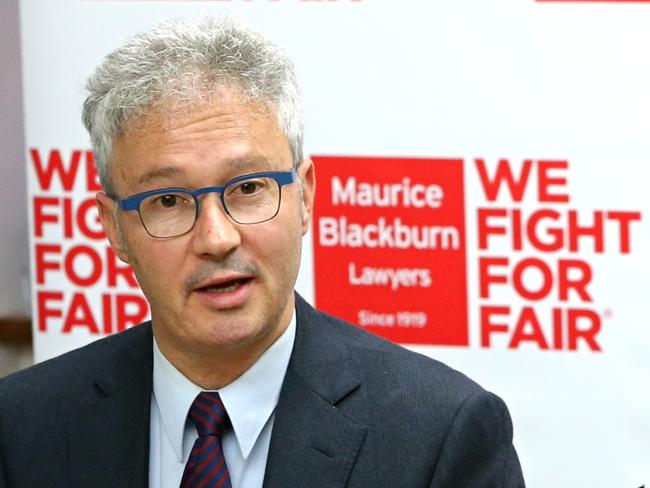Lawyer Josh Bornstein calls for a central registry of workplace sexual harassment complaints
GAG orders are preventing some victims of workplace sexual assaults and harassment from joining the #MeToo movement to share their stories.

VIC News
Don't miss out on the headlines from VIC News. Followed categories will be added to My News.
GAG orders are silencing victims of workplace sexual assaults and harassment who want to share their stories as part of the #MeToo movement.
Maurice Blackburn’s national head of employment law Josh Bornstein told the Sunday Herald Sun he had been approached by a number of women seeking advice on whether they were still bound by confidentiality clauses in settlement agreements made years ago.
“I think that’s been prompted by the Me Too movement and perhaps by the idea that perhaps after all this time there’s a recognition that confidentiality agreements are a two-edged sword,” he said.
#METOO MOVEMENT NEEDS BROADER REACH
#METOO NEEDS TO REACH WOMEN IN LOW-PROFILE INDUSTRIES
WENDY TUOHY: ROBERT DOYLE ALLEGATIONS A JUSTICE-FREE JOKE

“The whole issue of confidentiality is very complex and there’s no doubt that it can serve to protect wrongdoers, to mislead people about the extent of the problem. I think it helps keep the problem under the radar.”
With more than 90 per cent of workplace cases settled in private, Mr Bornstein said secret deals were helping mask the true extent of the problem in Australian workplaces.
Mr Bornstein called on the federal government to establish a central registry of workplace sexual harassment complaints where employers would be required to report the number of complaints to a body such as the Workplace Gender Equality Agency or the Human Right Commission.
“You could have a system that still respects the confidentially of individuals but at least documents whether the problem is continuing, worsening or getting better,” he said.
Although a register would not identify individual perpetrators, Mr Bornstein said it would help identify troubled workplaces and provide a measure of improvement.
Mr Bornstein said women wishing to overturn confidentiality agreements were among an influx of victims of recent and historic sexual harassment cases seeking legal advice since the sexual misconduct allegations against Hollywood film producer Harvey Weinstein sparked the #Me Too campaign.
“Because I’m a lawyer who practises in the area when ‘Me Too’ happened it didn’t surprise me, and the scale of the problem doesn’t surprise me, but that’s because I’m part of the eco system where most of my clients settle cases and nobody knows about it,” he said.
Mr Bornstein said most women wanted confidentiality due to feelings of shame, embarrassment and guilt after their traumatic experiences and fear of the negative impact publicity may have on their future employment prospects.
Those now wanting to speak out about historic abuse often feel guilt that the secret agreements they made may have shielded their perpetrator from accountability and perpetuated the problem.
“Years later the perspective sometimes shifts because the women think what if the perpetrator was able to continue preying on other women? And has my confidentiality agreement helped a perpetrator in an unintended way?” Mr Bornstein said.
While some women do choose to go public, such as the recent complaints surrounding disgraced former Lord Mayor Robert Doyle, Mr Bornstein said it was his strong experience that most still wanted the protection and “comfort” of a confidential settlement.
Mr Bornstein said he still favoured confidentially agreements because he was acutely conscious of the trauma women experience and the continuing widespread discrimination by employers against people who have asserted their rights before, be it in relation to sexual harassment, bullying or even WorkCover claims.
“The most important thing that I emphasise when I first meet with women in this situation is protecting and preserving their health,” he said.
“Their health is going to be with them for the rest of their life, long after they have dealt with the legal process.”
Maurice Blackburn are also pushing to have a six-month time limit on lodging sexual harassment complaints removed and greater protection for complainants under whistleblower laws.



